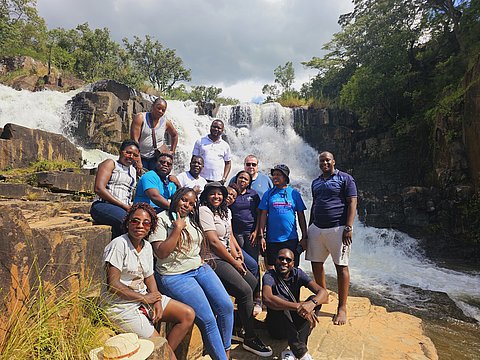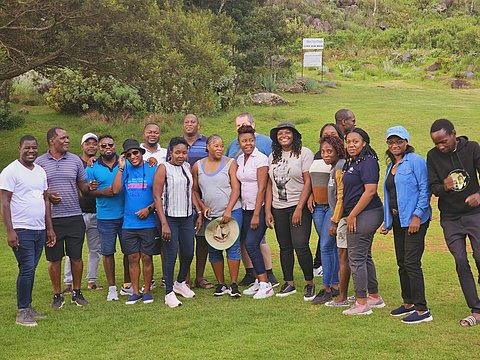Under the title “Digital Transformation and AI: Beyond Efficiency Gains, What Is Our Human Purpose?” 21 members of the KAAD Association of Scholars from Southern Africa participants (KASSA) met in the conference centre of the Diocese of Manicaland in Nyanga in eastern Zimbabwe. The seminar addressed the questions and consequences arising from the operation of artificial intelligence in various areas of society. The three speakers all came from the participants of the seminar. The keynote presentation was delivered by Adio Dinika, PhD student in political studies with a specialization on digital labour. He dealt with the use of artificial intelligence for the future of work and the labour market in African countries. Media specialist Kudakwashe Matambo gave the second presentation and discussed the creation of news content using AI. He partitularly pointed to false reporting in digital media and how this is supported by artificially created videos that appear deceptively real (so-called 'deep fakes'). This technique of media deception can have far-reaching political consequences. The third presentation came from Yvonne Fildah Matwayabe, lecturer in religious studies. She looked at AI from an ethical and theological perspective and addressed the question of where machines reach their limits and what constitutes being human. On the sidelines of the seminar, Marko Kuhn met our current KAAD-Incountry-scholars who are taking master's courses at universities in Harare. The seminar's excursion took the group into the wonderful nature of the Eastern Highlands around Nyanga.
At the meeting with the KAAD Partner Committee in Zimbabwe, it was important to say goodbye to three deserving members and to discuss the future structure of the committee under the leadership of KAAD alumna Dr Locardia Shayamunda. Professor Dr Anthony Chennells, Fr Dr Nigel Johnson SJ and Dr David Kaulemu ended their many years of service in the Partner Committee, which has its main task in identifying and appraising candidates for scholarships by getting to know them better in interviews. These take place every every six months and inform the Selection Committee in Germany about the quality of the applications and the personality of the applicants. Improving communication regarding the selection process was an important concern of the Zimbabwean partner panel and the departing members emphasized that they had interviewed a large number of very interesting and talented young people over the past fifteen to twenty years. The quality of the applications is remarkable.
As part of the trip there were also meetings with the German ambassador in Harare, Udo Volz, the head of the Konrad Adenauer Foundation office in Harare, Anna Hoffmann-Kwanga, the Archbishop of Harare, Dr. Robert C. Ndlovu, and Fr Felipe Fabiane, chargé d’affaires of the Nunciature, the Vatican Embassy in Harare. The Catholic University of Zimbabwe and the Arrupe Jesuit University were also stops on this trip.
The KAAD in Zimbabwe maintains a special relationship with the local art scene. Two KAAD-alumni are constantly initiating new projects: Misheck Masamvu (award winner of the KAAD Foundation Peter Hünermann 2017) and his wife Georgina Maxim have both been supported for studies in Germany and they are today supporting young artists in Zimbabwe, planning new exhibitions all over the world and at the same time showing themselves to be deeply rooted in their own society and country.






